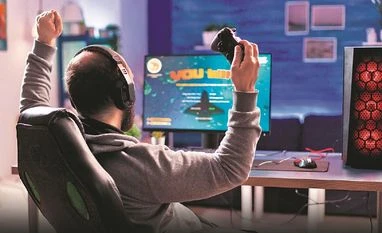China gaming companies unveil share buybacks after govt curbs cause rout
It remains to be seen how shares of Tencent Holdings , the world's biggest gaming company and its closest rival, NetEase, will fare this week after the apparent softening in stance from the regulator
)
The buyback announcements come on the heels of an apparent softening in stance by China's video game regulator.
Listen to This Article
A slew of smaller Chinese gaming companies have announced share buybacks - plans seen as an attempt to reassure investors after the market was spooked by regulatory moves to clamp down on consumer spending on games.
Last Friday, regulators published draft rules that would ban online games from giving players rewards if they log in every day, if they spend on a game for the first time or if they spend several times on a game consecutively. All are common incentive mechanisms in online games.
That sent shares in gaming companies plunging and as of Monday evening eight companies had unveiled plans to buy back shares worth up to 780 million yuan ($110 million) combined, citing confidence in China's gaming industry and the need to protect investors.
The buyback announcements come on the heels of an apparent softening in stance by China's video game regulator - the National Press and Publication Administration - which released a statement on Saturday saying the government would further improve the proposed rules after "earnestly studying" public views.
And on Monday, it approved new licenses for 105 domestic online games for December - a move that some analysts said "strongly demonstrated" that authorities remain supportive of the development of online games.
Also Read
"The shift towards a more reconciliatory tone is quite notable," said Charlie Chai, a Shanghai-based analyst at 86Research.
"Apparently the magnitude of that 'mini rebellion' by capital markets on Friday caught the regulator off guard, and allegations of backpedalling on previous commitments to 'responsible policymaking that instills investor confidence' has made [the regulator] nervous," he added.
The plans for buybacks served at best to stabilise share prices.
Among them, Shanghai-listed G-bits Network Technology Xiamen saw its shares end up 2% on Tuesday but has lost 11% since the draft rules were published. Shenzhen-listed Perfect World Co dropped 2% and has tumbled 16% since then.
The publication of the draft rules sparked fears that regulators were once again cracking down heavily on the sector.
The industry has only just returned to growth this year following the end of an extended clampdown in 2021 and 2022.
It remains to be seen how shares of Tencent Holdings , the world's biggest gaming company and its closest rival, NetEase, will fare this week after the apparent softening in stance from the regulator.
The two Hong Kong-listed firms lost a combined $80 billion in market value on Friday. Hong Kong markets have been shut for the Christmas long weekend and will reopen on Wednesday.
More From This Section
Don't miss the most important news and views of the day. Get them on our Telegram channel
First Published: Dec 26 2023 | 11:03 PM IST


